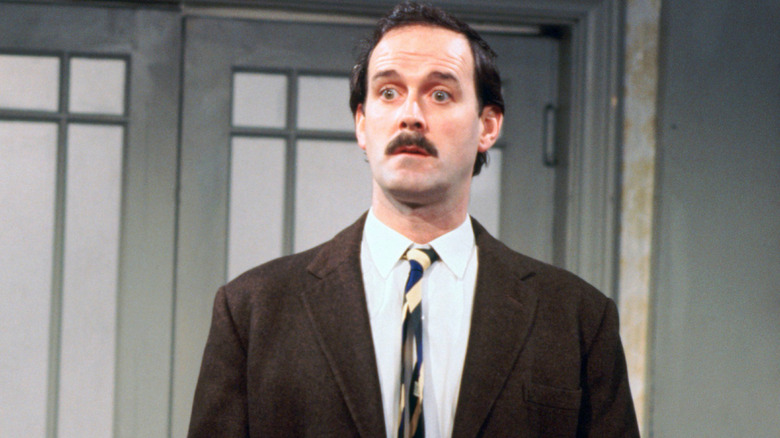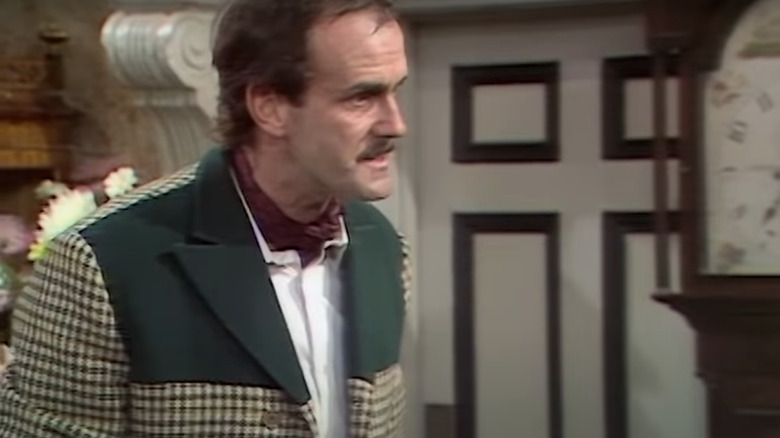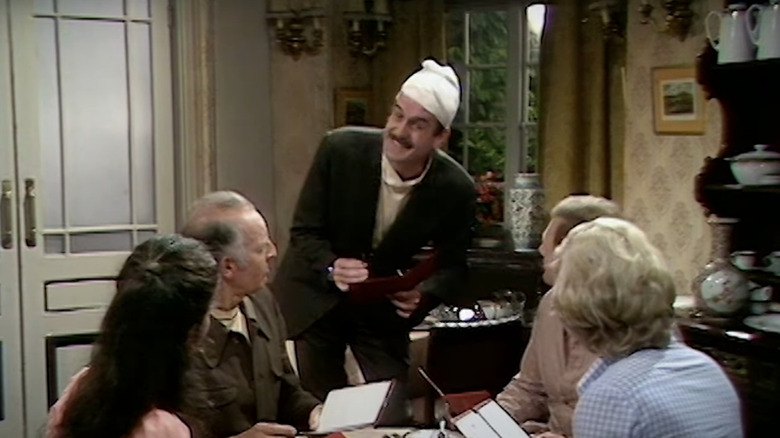Why John Cleese Considers Fawlty Towers' Suppressed Anger Funnier Than Real Anger
Basil Fawlty is one of those classic comedy characters that has truly stood the test of time. John Cleese's embattled hotelier was a big hit for the BBC back in the 1970s and remains a beloved figure in the history of comedy. The "Monty Python" member, who these days seems to crop up in the news more for his thoughts on "cancel culture" than his comedic ventures, was given free rein by the BBC to make his sitcom following the widespread success of his comedy troupe and their absurdist sketches. "Fawlty Towers" was the result. Debuting in 1975, and returning in '79, the show has maintained its appeal ever since.
Cleese has always been a stalwart supporter of comedy as an art form, never turning down an opportunity to share his thoughts on what's funny and why. The Cambridge graduate has similarly retained his ability to perform the most outrageous and seemingly spontaneous bit while maintaining an analytical view of the whole thing, having taken the time to break down humor and its inner workings on numerous occasions.
Naturally, then, the "Fawlty Towers" star has some thoughts on why his Basil Fawlty character struck such a chord back in the day, and the secrets to his enduring popularity.
Basil Fawlty's suppressed anger
Basil Fawlty is famously based on irascible hotelier Donald Sinclair, the co-owner of the Gleneagles Hotel in Devon, UK, where John Cleese and his "Python" colleagues stayed while filming in the early 1970s. Cleese has referred to Sinclair as being "gratuitously rude, because like all British hoteliers he operated on the principle that 'I could run this hotel properly if it wasn't for the guests.'" A favorite story the actor has told on numerous occasions, including to BBC talkshow host Parkinson, involved Sinclair putting "Python" member Eric Idle's briefcase, which he'd left at the hotel, behind a wall because he thought "there was a bomb in it," prompting Cleese to opine that the hotel proprietor had "real madness in him."
Much of that made its way into "Fawlty Towers," with Basil Fawlty displaying a similar zaniness in his own frenetic exploits. But there was more to it than that. As Cleese told Interview magazine in 2014, it's not just about being angry and wild, there has to be an escalation to the anger in order for an audience to really find it funny:
"When he starts the shows, he doesn't start mad at the beginning in any of them. His anger develops primarily because of his anxiety. He's frightened that somebody will find something out ... things get worse and worse and the frustration leads to the anger. People laugh because they can understand why he's in this state"
In Cleese's view, watching a character attempt to suppress his anger before it explodes is where the real comedy is to be found. And with "Fawlty Towers," that's the basic formula that all of the show's 12 episodes follow.
Don't mention the war on comedy
In truth, there's a lot more about "Fawlty Towers" that makes it work so well. The supporting characters were excellent, with Basil's comparatively calm and polite wife Sybil Fawlty (Prunella Scales) providing the perfect balance to her husband's misanthropic cynicism. Connie Booth's maid Polly Sherman and the lovably incompetent waiter Manuel (Andrew Sachs) rounded out a cast that gave John Cleese's character the space he needed to repeatedly play out the journey from suppressed anger to explosive outbursts.
But while Fawlty's antics seem simple in their physicality, a lot of thought obviously went into getting it right. Cleese used his characteristic insight to really think about the way "Fawlty Towers" presented its comedy. He told the actors at the outset to play to the millions of people watching at home rather than waiting for the 200-person studio audience to finish laughing before moving on to the next joke. That allowed them to pile on the jokes and keep TV audiences engaged. As he told the BBC: "My attitude to comedy has always been very simple which is that I try to make people laugh as much as possible."
It's been a while since Cleese has put these philosophies on comedy into practice. These days he can be found in Rob Schneider comedies and hosting an upcoming show on what's widely thought of as right-leaning UK TV channel GB News as part of his ongoing crusade against "wokeism." It would be great to see Cleese get back to actually showing us what's funny rather than letting his suppressed anger boil over into telling us all about why comedy is dead. Let's hope the 83-year-old can make it full circle and get back to performing before he checks out.


